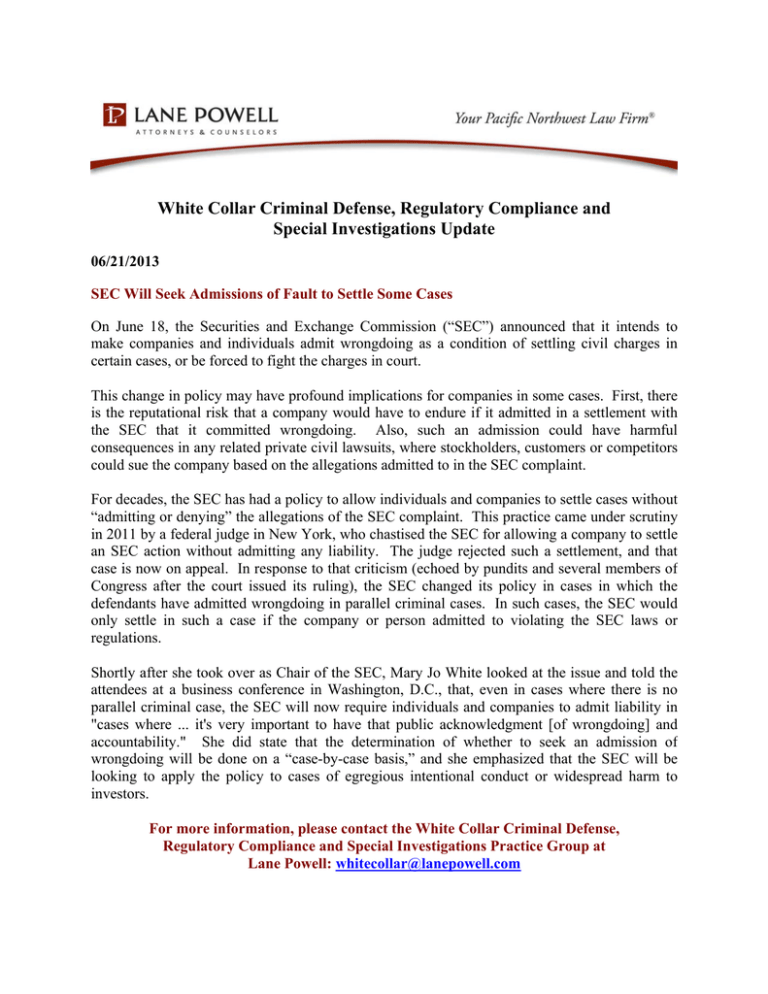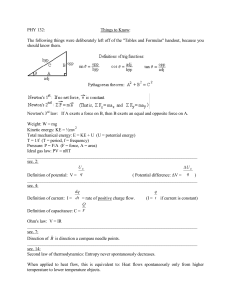White Collar Criminal Defense, Regulatory Compliance and Special Investigations Update
advertisement

White Collar Criminal Defense, Regulatory Compliance and Special Investigations Update 06/21/2013 SEC Will Seek Admissions of Fault to Settle Some Cases On June 18, the Securities and Exchange Commission (“SEC”) announced that it intends to make companies and individuals admit wrongdoing as a condition of settling civil charges in certain cases, or be forced to fight the charges in court. This change in policy may have profound implications for companies in some cases. First, there is the reputational risk that a company would have to endure if it admitted in a settlement with the SEC that it committed wrongdoing. Also, such an admission could have harmful consequences in any related private civil lawsuits, where stockholders, customers or competitors could sue the company based on the allegations admitted to in the SEC complaint. For decades, the SEC has had a policy to allow individuals and companies to settle cases without “admitting or denying” the allegations of the SEC complaint. This practice came under scrutiny in 2011 by a federal judge in New York, who chastised the SEC for allowing a company to settle an SEC action without admitting any liability. The judge rejected such a settlement, and that case is now on appeal. In response to that criticism (echoed by pundits and several members of Congress after the court issued its ruling), the SEC changed its policy in cases in which the defendants have admitted wrongdoing in parallel criminal cases. In such cases, the SEC would only settle in such a case if the company or person admitted to violating the SEC laws or regulations. Shortly after she took over as Chair of the SEC, Mary Jo White looked at the issue and told the attendees at a business conference in Washington, D.C., that, even in cases where there is no parallel criminal case, the SEC will now require individuals and companies to admit liability in "cases where ... it's very important to have that public acknowledgment [of wrongdoing] and accountability." She did state that the determination of whether to seek an admission of wrongdoing will be done on a “case-by-case basis,” and she emphasized that the SEC will be looking to apply the policy to cases of egregious intentional conduct or widespread harm to investors. For more information, please contact the White Collar Criminal Defense, Regulatory Compliance and Special Investigations Practice Group at Lane Powell: whitecollar@lanepowell.com This is intended to be a source of general information, not an opinion or legal advice on any specific situation, and does not create an attorney-client relationship with our readers. If you would like more information regarding whether we may assist you in any particular matter, please contact one of our lawyers, using care not to provide us any confidential information until we have notified you in writing that there are no conflicts of interest and that we have agreed to represent you on the specific matter that is the subject of your inquiry. Copyright © 2013 Lane Powell PC Seattle | Portland | Anchorage | Tacoma | London 2



